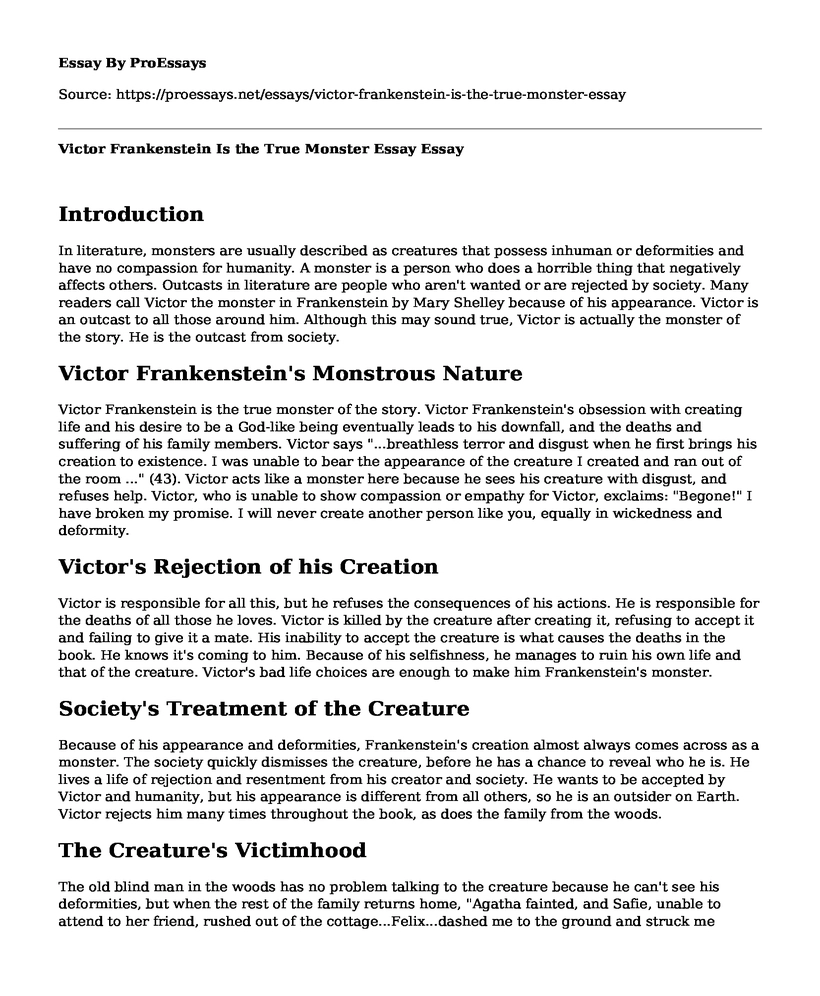Introduction
In literature, monsters are usually described as creatures that possess inhuman or deformities and have no compassion for humanity. A monster is a person who does a horrible thing that negatively affects others. Outcasts in literature are people who aren't wanted or are rejected by society. Many readers call Victor the monster in Frankenstein by Mary Shelley because of his appearance. Victor is an outcast to all those around him. Although this may sound true, Victor is actually the monster of the story. He is the outcast from society.
Victor Frankenstein's Monstrous Nature
Victor Frankenstein is the true monster of the story. Victor Frankenstein's obsession with creating life and his desire to be a God-like being eventually leads to his downfall, and the deaths and suffering of his family members. Victor says "...breathless terror and disgust when he first brings his creation to existence. I was unable to bear the appearance of the creature I created and ran out of the room ..." (43). Victor acts like a monster here because he sees his creature with disgust, and refuses help. Victor, who is unable to show compassion or empathy for Victor, exclaims: "Begone!" I have broken my promise. I will never create another person like you, equally in wickedness and deformity.
Victor's Rejection of his Creation
Victor is responsible for all this, but he refuses the consequences of his actions. He is responsible for the deaths of all those he loves. Victor is killed by the creature after creating it, refusing to accept it and failing to give it a mate. His inability to accept the creature is what causes the deaths in the book. He knows it's coming to him. Because of his selfishness, he manages to ruin his own life and that of the creature. Victor's bad life choices are enough to make him Frankenstein's monster.
Society's Treatment of the Creature
Because of his appearance and deformities, Frankenstein's creation almost always comes across as a monster. The society quickly dismisses the creature, before he has a chance to reveal who he is. He lives a life of rejection and resentment from his creator and society. He wants to be accepted by Victor and humanity, but his appearance is different from all others, so he is an outsider on Earth. Victor rejects him many times throughout the book, as does the family from the woods.
The Creature's Victimhood
The old blind man in the woods has no problem talking to the creature because he can't see his deformities, but when the rest of the family returns home, "Agatha fainted, and Safie, unable to attend to her friend, rushed out of the cottage...Felix...dashed me to the ground and struck me violently with a stick"(123-124). His looks are all that the family considers important and they don't allow the creature to talk or explain themselves. When he wants to do the right thing for humanity, the creature lives as a victim and an outcast. On page 133, he realizes that he is alone and miserable. ..." All the creature needs is someone to accept him and teach him how to live. He is the Frankenstein outcast because of his life of rejection and judgement.
Conclusion
Although the creature is described as a monster in Frankenstein by his physical appearance, he is actually a mistreated outcast trying to do the right things in society. The society judges the creature solely on his appearance and doesn't give him a chance to express his personality. Through his actions and personality, Victor is the true monstrosity throughout the book. Victor's hatred for the creature, obsession with making life and yearning to be a God-like power and status all show the inner monster he is. Victor is the true monster, who takes his life and makes the creature suffer. The creature is an outcast who longs for love and acceptance.
Works cited
Shelley, Mary. Frankenstein. Bantam, NY. 1818.
Cite this page
Victor Frankenstein Is the True Monster Essay. (2022, Aug 08). Retrieved from https://proessays.net/essays/victor-frankenstein-is-the-true-monster-essay
If you are the original author of this essay and no longer wish to have it published on the ProEssays website, please click below to request its removal:
- Compare and Contrast Essay Example: Justice in Hamlet and A Prayer for Owen Meany
- The Lamb to the Slaughter Critical Essay
- Components of Myths Argumentative Essay
- Young Goodman Brown: Faith vs. Curiosity Essay Example
- Brighton Beach Memoirs Essay Example
- Essay Example on 1984: A Vision of a Dystopian Future With Technological Control
- Essay on Judy Blume: Champion of Modern Literature & Censorship Coalition







